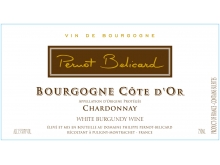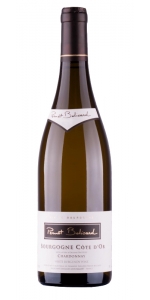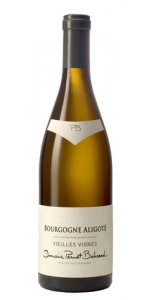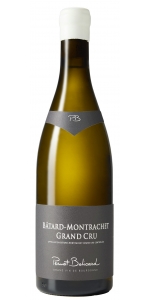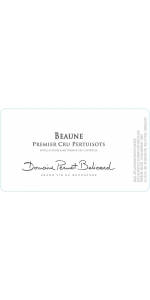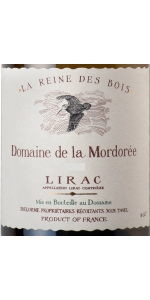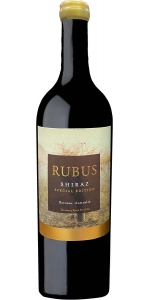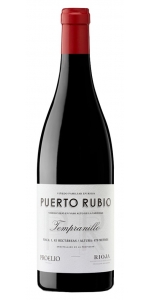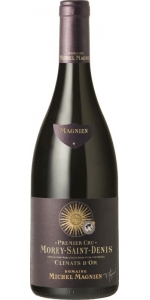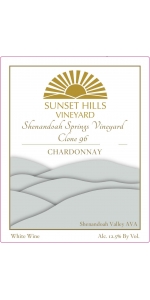Pernot Belicard Bourgogne Cote d'Or Chardonnay 2018
| Country: | France |
| Region: | Burgundy |
| Winery: | Pernot Belicard |
| Grape Type: | Chardonnay |
| Organic: | Yes |
| Vintage: | 2018 |
| Bottle Size: | 750 ml |
The grapes for this wine come from a small parcel of 6 acres in the village of Puligny-Montrachet, resulting in wines of exceptional quality. The same viticulture and vinification methods are applied for all the wines from the Domaine.
The wine offers an expressive nose of white flowers, stone fruits and buttered bread notes. The mouth is mineral and elegant, and delicate toasty nuances bring extra length in the mouth alongside a fresh acidity and a good balance.
Pair with veal Stew, Grilled Salmon, Epoisse cheese
Pernot Belicard Aligoté is produced from old vines planted in 1956 and 1971 by Philippe Pernot's grand father.
Wine is very aromatic, with some tropical notes with a hint of white flowers and white peach. The wine is also quite mineral, due to the Aligote grapes grown on limestone soils in the commune of Puligny Montrachet. Finish is long and balanced.
Oysters, St Jacques Cassolette, Roasted Gambas, Comté Cheese.
Pernot Belicard Aligoté is produced from old vines planted in 1956 and 1971 by Philippe Pernot's grand father.
Wine is very aromatic, with some tropical notes with a hint of white flowers and white peach. The wine is also quite mineral, due to the Aligote grapes grown on limestone soils in the commune of Puligny Montrachet. Finish is long and balanced.
Oysters, St Jacques Cassolette, Roasted Gambas, Comté Cheese.
Pernot Belicard Batard Montrachet Grand Cru is made from 100 percent Chardonnay.
Aromas of white peach, white apple, with a beautiful minerality. Also lighty salty, chalky aromas and some bread and brioche flavors and a hint of vanilla.
Poultry with cream based sauces, French cheese, like camembert, but not too strong, also seafood and fish.
Pernot Belicard Batard Montrachet Grand Cru is made from 100 percent Chardonnay.
Aromas of white peach, white apple, with a beautiful minerality. Also lighty salty, chalky aromas and some bread and brioche flavors and a hint of vanilla.
Poultry with cream based sauces, French cheese, like camembert, but not too strong, also seafood and fish.
Pernot Belicard Beaune Pertuisots Blanc is made from 100 percent Chardonnay.
The grapes for this wine come from a small parcel of 1.1 acre in the village of Beaune. This Chardonnay offers an intense nose on yellow fruits, apricot and peach. Beautifully textured, round and opulent on the palate, the wine combines a mineral character, power and freshness with a crisp and long finish.
Pair with grilled fish, Bresse chicken, Prawns.
Pernot Belicard Bourgogne Blanc is made from 100 percent Chardonnay.
The grapes for this wine come from a small parcel of 6 acres in the village of Puligny-Montrachet, resulting in wines of exceptional quality. The same viticulture and vinification methods are applied for all the wines from the Domaine.
The wine offers an expressive nose of white flowers, stone fruits and buttered bread notes. The mouth is mineral and elegant, and delicate toasty nuances bring extra length in the mouth alongside a fresh acidity and a good balance.
Pair with veal Stew, Grilled Salmon, Epoisse cheese.
This small six-hectare domaine located in the heart of Puligny-Montrachet is making rapid strides. Philippe Pernot (a scion of the Paul Pernot dynasty) launched the Pernot-Belicard label in 2009 after marrying Miss Belicard, daughter of Mr Belicard (who owned vineyards in Puligny-Montrachet). In the vineyards, Philippe cultivates the soils, de-buds aggressively and takes pains to retain his old vines in good health. The grapes are harvested by hand, with Philippe typically among the earlier pickers in the village. Since 2014, there's more sorting, the grapes passing over a shaker table before being whole cluster pressed. Initially, the wines were bottled to make room for the new vintage, but Philippe, evidently an inquiring mind, felt that something was missing: now, the wines stay in barrel until August, but spend an additional three to six months in temperature controlled stainless steel tanks with the fine lees. The result are wines that are more integrated and complete. These are already very good wines, and Philippe possesses some enviable parcels, but it is his desire to refine and improve that marks this out as an estate to watch.
Mordoree Lirac Blanc Reine des Bois is made from Grapes : Grenache 35 % Clairette 25 % Viognier 10 % Roussanne 15 % Marsanne 10 % Picpoul 5%>
Color : green gold
Aromas : white fruits, peach, apricot, pear, violet.
Palate : rounded, long finish, highly flavoured.
Ageing Potential : 4-5 years.
Surface : 4 Ha. Yield : 35 Hl./Ha. Vineyard age : 30 years Terroir : Clay / chalk with pebble stones. Harvest : by hand Vinification : skin maceration and direct pressing with temperature control. Fermentation : oak barrel fermentation for 25% of the total volume
Pairs well with appetizers, fish, seafood.
Review:
"Iconic grapes of 35% Grenache, 25% Clairette, 10% Viognier, 15% Roussanne, 10% Marsanne, and 5% Picpoul from 40-year-old vines make up this organic Southern Rhône white. A floral bouquet of white tea and jasmine make their designs on a defined slate mouthfeel. Lime pops with a tart center, along with notes of peach and gingerbread on a keen, edgy finish."
- The Somm Journal (Feb/March 2022), 94 pts
Rubus Special Edition Barossa Shiraz is made from 100 percent
The Rubus Project was created by Fran Kysela as a way to source & sell incredible wines at value prices. All wines in this international project are hand-selected by Fran Kysela. Rubus wines are fruit driven, true-to-type values that over deliver - a true representation of quality for the consumer at an excellent price.
Deep red with a slight purple hue on release. The wine has a rich mix of dark chocolate infused with coffee bean and black liquorice, then scents of tar, aniseed, raw (pure) soy and black olive on the nose. The palate is expansive, and yet balanced and finessed. An amalgam of dark berried flavors and textural sensations. The 100% new oak is completely absorbed, meshed with ripe tannins, completing a palate of impressive length and youthfulness.
Sourced from Thorn-Clarke’s St Kitts vineyard (Block 7) in the far north of the Barossa, the Rubus Reserve demonstrates both the strengths of the region and the unique characters of the vineyard.
A thin layer of topsoil over weathered marble, schist and shale mean the vines work hard to source water and nutrients. The result is naturally low yields concentrating the power and density of the fruit. Diurnal temperature variation is another important aspect of St. Kitts. Warm daytime temperatures are followed by cool nights with variations of up to 30°C (55°F) from the peak during the day into the cool night minimums.
Review:
“Earthy detail develops in this sleek and juicy shiraz, a tarry streak under fresh plum and bruised strawberry. The tannins have gravity and precision, their bracing intensity and concentration integrated into what panelist David Hawkins described as “a big, powerful wine with great liveliness.” While suited to aging, this is accessible now if you’re grilling meats to serve with it.”
- Wine & Spirits (February 2023), 94 pts
"Made by Thorn-Clarke for the US market, this has a rich and vivid nose with blueberry, violet, dark plum and subtle oak spice in play. The palate has a succulent feel with plenty of rich, open-knit blackberry and blueberry flavor. Smoothly delivered tannins carry long and even. Drink over the next decade."
- James Suckling (November 2021), 94 pts
Sourced from a vineyard at 505 metres above sea level in San Vicente de la Sonsierra, the wine takes its name from the site it is located on. The soils are primarily composed of depleted limestone in the subsoil and pebbles on the topsoil. These types of soils offer long-ageing capacity, freshness, volume and structured wines.
Fresh, structured and complex, this wine is very aromatic, with intense aromas of wild black fruits, accompanied by deep balsamic aromas and licorice. A silky texture and mineral notes, it is round, powerful and polished on the palate with flavors of black fruits, prunes, balsamic and spice. A long and persistent finish.
Meat and game, either grilled, baked or stewed, pastes, creams and soups, all kind of meat recipes, roast lamb.
Review:
"Dark plums, wild berries, dried herbs and warm earth with sweet spices and discreet vanilla creaminess interwoven to the nose. A medium-to full-bodied tempranillo with chalky, calculated tannins and vivid acidity. Lively, with a bright core of fruit on the center-palate and a flavorful, spicy finish. Naturally concentrated, but extremely drinkable, too. Long and bright. Drink or hold."
- James Suckling (September 9th 2022), 95 pts
Domaine Michel Magnien has evolved into a Burgundy producer of a singular style and philosophy from cellars located in the village of Morey-Saint-Denis. In 1993, Frédéric Magnien persuaded his father Michel to begin domaine bottling. The domaine is now certified biodynamic by Demeter and the wines are produced without the use of new oak.
The domaine’s 45 acres are spread across the villages of Morey-Saint-Denis, Gevrey-Chambertin, Chambolle-Musigny, and Vosne Romanée, with holdings in several premier cru and grand cru vineyards. These include the grand crus Clos de la Roche, Clos Saint-Denis, and Charmes-Chambertin. Frédéric Magnien maintains an average vine age of 50 years.
Morey-Saint-Denis 1er Cru "Climats d'Or" is a blend of five premier crus in the village of Morey-Saint-Denis: Cheseaux, Charrières, Clos Baulet, Chaffots, Monts Luisants. The wine was fermented with indigenous yeasts in stainless steel tanks followed by several months aging in half terracota amphora & half used pièce. Around 20% whole clusters were included in the cuvée.
Morey-Saint-Denis 1er Cru "Climats d'Or" combines the structure of Gevrey-Chambertin with the perfume of Chambolle-Musigny. This wine shows fresh red berries on the nose with notes of violets, spice, and earth. Old vines and heavier soils give this wine weight and richness on the palate.
Red Burgundy might be the world’s most flexible food wine. The wine’s high acidity, medium body, medium alcohol, and low tannins make it very food friendly. Red Burgundy, with its earthy and sometimes gamey character, is a classic partner to roasted game birds, grilled duck breast, and dishes that feature mushrooms, black truffles, or are rich in umami.
Sunset Hills Shenandoah Springs Chardonnay is made from 100 percent Chardonnay.
This is our first release of a clone-specific wine for Sunset Hills. The goal is to show you a specific terroir, one that year after year delivers excellent fruit quality. I chose clone 96 for its complexity both in ripening and barrel aging. During ripening, the fruit has notes of pineapple and pear with great acidity. I saw this wine as a chance to highlight not only the vineyard, but how detailed we can get in growing and making wine.
100% Chardonnay:
75% Clone 96
20% Clone 76
5% Clone 17
Notes of light honeysuckle, Asian pear, raw almond, and lemon custard. Medium body and medium acid.
- back
Pago de los Capellanes Tinto Joven is made from 100% Tempranillo.
Joven Roble is for everyone and for every moment. Fresh and vibrant, while at the same time complete and full of energy. A clear, affable, open and solid character. We take its production very seriously to obtain a blissfully satisfying wine with every vintage.
Review:
All Tempranillo, the 2022 Ribera del Duero Tinto Joven has a deep purple hue as well as beautiful blue fruits, violets, graphite, and charcoal aromas and flavors. Along with medium to full-bodied richness, it has wonderful purity and precision, fine tannins, and a great finish. It's a stunning value.
-Jeb Dunnuck 94 Points
Pago de Carraovejas El Anejon is made from 93%, Cabernet Sauvignon 5% and Merlot 2%.
El Anejon vineyard is a terraced plot on a steep slope, oriented toward the sun and with great views of the Castle of Peñafiel. The soil of the narrow terraces has a compact, loamy limestone texture. The presence of the white-colored limestone calcium salts contributes to a distinctive minerality in this wine. Only made in exceptional vintages.
Review:
"A single-plot wine from the top terraces of the site from an excellent vintage, the 2021 El Anejon is powerful and truly outstanding. Tempranillo is blended with Cabernet Sauvignon and Merlot to an exceptional end, aged 12 months in larger French oak barrels after a triple selection of the grapes. Sharp red fruit has an underbelly of herbal earthiness beneath the fruit, while tight, refreshing acidity accentuates the mineral-driven texture. Bottled in June 2023, this might be the producer’s best wine of the vintage, which is saying a lot, as they’re all of outstanding quality. This will hit a high point in 5-7 years and keep going another 20. - Virginie BOONE"
- Jeb DUNNUCK (August 2°25), 98 pts

